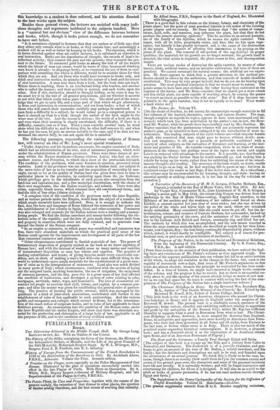MR. LONG'S INTRODUCTORY DISCOURSES ON JURIS- PRUDENCE AND ROMAN LAW.
Tam volume is the first product of the Middle Temple's endeavour to in- stitute a more scholastic training for the bar than consists in handling a knife and fork, and a somewhat larger and more liberal preparation than is generally to be met with in a pleader's office. An examination appears to be contemplated by the Benchers ; and possibly they may think of re- viving the exercises and moots of our ancestors, by which acuteness and learning had a field for display in the mimic strife, and a barrister was in some degree tested in embryo. As yet, however, they have got no further than the institution of a course of lectures for the students on General Jurisprudence and Civil Law,—attendance on which would-seem to be optional ; and they have appointed Mr. Long their lecturer.
A better choice could not have been made. If Mr. Long's acquaint- ance with English law may not equal that of some who have devoted their time to its acquirement and practice without a thought beyond, he has a competent knowledge of its principles and specialties, particu- larly for the purpose of imparting large general views. But he has, what few have, besides—an extensive acquaintance with the whole field of Ro- man law, and of European law so far as it is based upon the Roman; nor is he unknowing in those more barbarous or limited customs, which, introduced by the different Northern invaders, eventually formed by amal- gamation with the Roman law the entire jurisprudence of Western Eu- rope. Then, Mr. Long is more than a lawyer however liberal. He is thoroughly versed in the learned Longues, not as a mere linguist but a phi- losophical grammarian : he has studied the history of Rome, not only in the events and persons, the institutions and constitution of that wonderful people, but has penetrated to the very essence of the national spirit which formed and governed all the rest : he is also versed in German literature, and the stores of learning and lucubrations which the plodding industry of that nation has opened. If he has drawn front the same source something of an involved and cumbrous character of composition, yet Plutarch and native power have given him a homely simplicity and vigour of style, reminding one of the heroic age.
The volume before us contains two discourses ; one introductory to the Templar object and to general jurisprudence, the other to Roman law. The first is characterized by an able exposition of the use of lectures or oral tuition; and contains a view of universal or natural jurisprudence, as opposed to international and municipal law. But it seems to us hardly profound enough ; though profundity might not be designed by the lec- turer, or perhaps possible in his space. It is strong evidence that those laws which generally obtain throughout every system are "natural"; but the first stage or foundation of the history if not the philosophy of juris- prudence must be sought in the conduct of man in the lowest or most " natural " state to which observation has traced him. And we think it will be found that property—a sense of nteurn—is the foundation of all Jaw; before the connubial or parental feelings, or even the sense of re- venge, or care for the security of life, even for the man's own.
The second lecture, on Roman law, is very able and comprehensive. In a few pages Mr. Long presents his reader with a condensed summary of Roman history; a defence of the Roman aggression, as being in them, and necessary for the advance of the world ; and unfolds the pith and mar- row of their national character. A survey of the Roman law follows, from its origin till its codification under Justinian; during which its different sources, its various branches, and the various authority of va- rious species of laws or decisions, are pointed out, with notices of some of the most eminent Roman lawyers. The current of its influence upon the Northern races, the limited nature of their barbarous laws or rather customs, and the manner in which an amalgamation probably took place, are briefly indicated ; ample justice being done to Mr. Spence's argu- ment on the obligations of English to Roman law, in his Equitable Ju- risdiction of the Court of Chancery. The consequent necessity of
this knowledge to a student is then enforced, and his attention directed to the best works upon the subject.
Resides these general views, the lectures are enriched with many judi- cious thoughts and arguments incidental to the subjects handled. Here is a "natural but not obvious" view of the difference between lectures and books, which, though it looks patent enough, we do not remember to have met before.
"it is sometimes objected to lectures that they are useless or of little use; that they either only contain what is in books, or they contain less; and accordingly a student will do as well or better by keeping to his books. The objection, which is in terms directed against what are called lectures, is in substance an objection to oral instruction. Books are the depositories of thought, the records of man's in- tellectual activity; they connect the past and the present; they transmit the pre- sent to the future. To commend good books as among the best of all the wealth which the labour of man can create, would be waste of time, because all thinking men know it already: to disparage books, or to commend the use of them in com- parison with something else which is different, would be to mistake them for that which they. are not. And yet time who would have recourse to books only, and think oral instruction useless, do mistake both the nature of a book and the nature of oral instruction. A man may learn from a book, but the book does not teach. Where there is teaching, there is an intellectual being who teaches, and another who is called the learner- and their activity is mutual, and each works upon the other. Now if this distinction should be thought trifling, as by some it may be, we must try it by the test of all general propositions, and see whether it accords or not with that which really takes place every day. The chief part of the know- ledge that we get in early life, and a large part of that which we get afterwards, is from oral instruction or communication, and not from books; a fact of which those who will search their memories carefully may perhaps be convinced. If a man finds a difficulty in a subject, he would rather go to a competent person to have it cleared up than to a book, though the author of the book might be the wiser man of the two. And the reason is obvious: the words of a book are fixed, and even when their meaning is clearly ascertained, the difficulty, if there is a difficulty, remains just as it was. When a man consults another man, he must state what his difficulty is; and in doing this he often half removes it; and when he has put his case, he gets an answer suitable to the case, and if he does not un- derstand the answer fully, he can ask again till he is satisfied."
The following passages, expounding the various subjects of Roman law, will convey an idea of Mr. Long's more special treatment. "Under Augustus and his immediate successors, the empire consisted of Italy, which had an administration of its own, and of numerous provinces, which were tinder the administration of Roman governors. There were three classes of per- sons within the Roman dominions—Roman citizens, Latini, who had an inter- mediate status, and Peregrioi, to which class most of the provincials belonged. The condition of the provinces, with some features in common, presented many varieties. Land in the provinces was not the same as Italian land, nor subject to the same rules of law as to its transfer and the acquisition of ownership by usu- capio, except so far as the quality of Italian land was given from time to time to particular places in the provinces, by conferring upon them the jns Italicum; which privilege gave to the inhabitants of such places also exemption from the land-tax and capitation-tax, and a free municipal constitution, with the choice of their own magistrates, like the Italian municipia and colonize. There were also cities, especially Greek towns, which retained their old constitutional forms, and had the tale of free cities (liberai civitatea.) 8 •
"A complete view of the condition of the provinces under the later Republic, and at various periods under the Empire, would form the subject of a treatise, for which ample materials have been collected. Here' it is enough to indicate the fact, that the laws and language of Rome followed the extension of her power and the establishment of her colonies in Spain, Gaul, and other countries. Commerce was also enlarged and secured; for the Italian nations were a trading.and a money- loving people. We find the Italian merchant and money-lender following the vic- torious arms of the republic; and the love of gain made them venture their lives and property in countries which were not fully subdued, and to penetrate even beyond the limits of the Roman conquest.
"In an empire so extensive, in which peace was established and commerce was free, there were abundant materials on which the practical good sense of the Roman could operate for the imprdvement and development of all parts of the law that concerned commerce and contracts.
"Other circumstances contributed to furnish materials of law. The power of testamentary disposition of property existed as far back as we know anything of Roman law; and with the increase of wealth arose as many modes and varieties of testamentary disposition as man has whims and caprices. The .practice of making substitutions and trusts, of giving legacies under every conceivable con- dition, and, in short, of making a man's last will—the most difficult thing in the world to understand—gave ample materials for the establishment of a great num- ber of rules as to the interpretation of testaments. Land also was much divided in many parts of Italy; which circumstance, combined with the system of laying out the assigned lands, marking boundaries, the use of irrigation, the enjoyment of common pastures, and the like, gave rise to a great mass of law that affected the condition of landowners, and developed a system of rules relating to sales, mortgages, servitude, water, ways, and boundaries. The love of commercial ad- venture led people to combine their skill, labour, and capital, for a common pur- pose; and thus the matter was given for establishing the general rules of partner- ship. The practice of farming the public revenue, which was managed by the publicani in a kind of joint-stock associations, contributed still further to the establishment of rules of law applicable to such partnerships. And the various guilds and companies and colleges which existed at Rome, led to the determina- tion of the exact notion of corporate bodies, and to rules of law applicable to these fictitious persons. An examination into the condition of the Roman state, under the later Republic and the earlier Empire, will show that there was abundant ma- terial for the production and elaboration of a large body of law, applicable to all the purposes of life, and to the condition of every civilized nation."



























 Previous page
Previous page